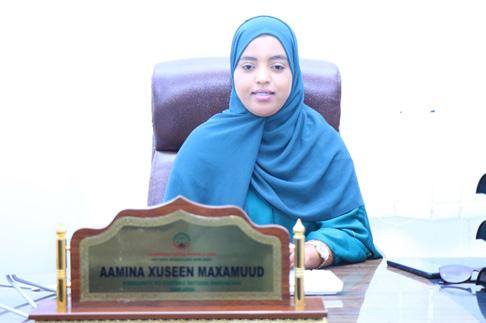
17 minute read
About the New Civil Service Commission Vice Chairman
Amina Hussien Mohamoud
was born and raised in Hargeisa, Somaliland.
Advertisement
She holds a Bachelor’s Degree in Finance and Master’s Degree in Executive Business Administration from Abaarso Tech University in Hargeisa.
She has worked as a Program Officer at Institute of Practical Research and training as a trainer and business management consultant. She also worked as Admin & Finance, Tax officer at the Somaliland Inland Revenue Department.
Beginning of 2021, Amina was appointed as the Director General of the Ministry of Telecommunication performing coordination role at the Ministry as well as policy setting while the Functional heads of department are responsible for executing the technical aspects of the Ministry’s functions.
Currently, Amina was appointed as Deputy Chairman Civil Service commission by the President of Somaliland.
Summary of Public Service Reform
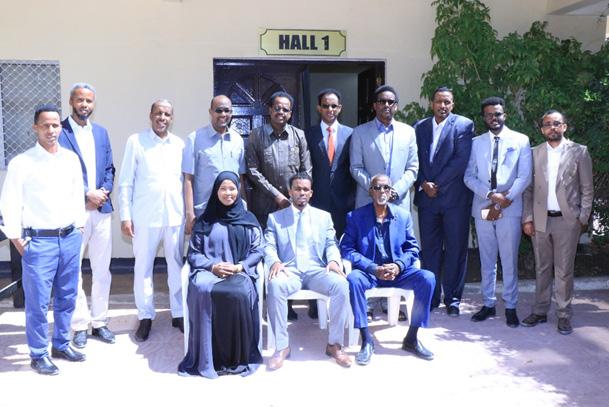
Steering Committee Meeting Discussions
Civil Service Strengthening Project uses the existing governance and management arrangements designed under the government’s Public Service Reform Strategy. The overall project implementation is led by the Civil Service Commission (CSC) in collaboration with the other MDAs to implement different components of the project. The Project’s Public Service Reform Steering Committee is responsible for providing strategic oversight and guidance for the project. The Steering committee, chaired by the Minister of Employment, Social Affairs and Family (MESAF) conduct their meetings on quarterly basis to look into the project’s activities and approve the annual plan as well as the quarterly reports. Two Steering Committee meetings have been held during the quarter from October – December 2021 to discuss several issue regarding the public service reforms. During those meetings, the committee reviewed and generally approved the Civil Service Strengthening Quarterly Report for October – December 2021 as well as the CSSP 1 & 2 Work Plans which have been prepared by the project team. Other issues have also been discussed including the MDA structures, start of Pay & Grading Policy development, TMP staff performance, and capacity building for the government officials as well as the general civil service, policy development and other issues. The meeting has also listened and discussed the progress regarding the expected Governance project that is expected to start in the near future.
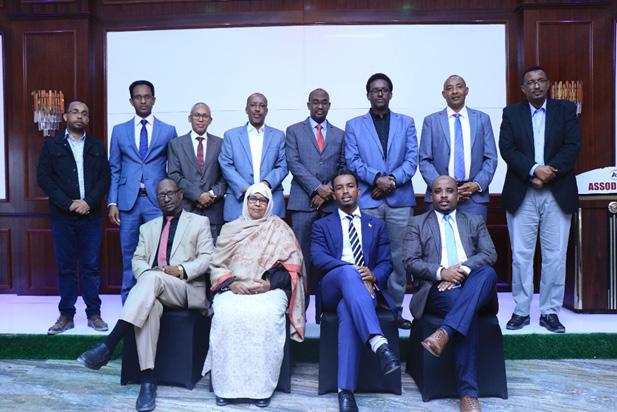
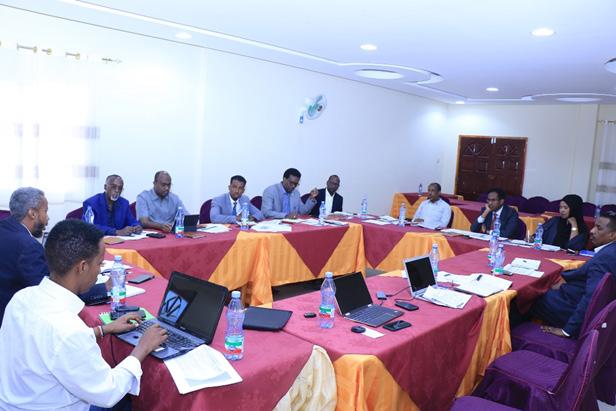
Pay & Grading Policy Development Update
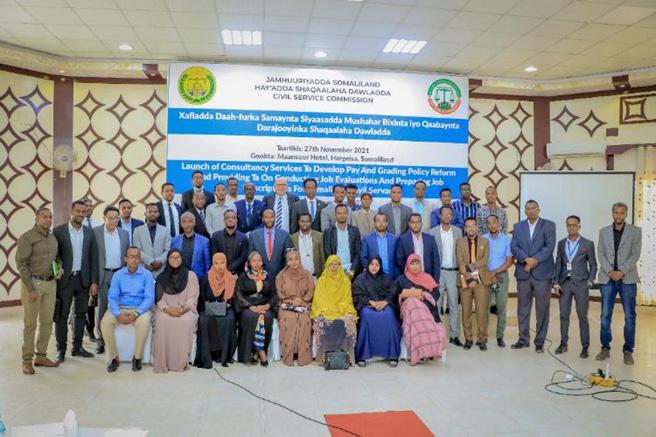
The Civil Service Commission, representing the Government of Somaliland, recently awarded Public Administration International (PAI) in a joint venture with Service Solutions Group (SSG) a contract to provide consultancy services to develop Pay and Grading policy reform and to provide technical assistance on conducting job evaluations and preparing job descriptions for Somaliland Civil Servants. A launching event was held at in November 2021 with key government Ministers and senior civil servants present, including Civil Service Commission Management, Family and Social Affairs, Deputy Finance Minister and other top government officials. During the event, welcome addresses were presented by CSC officials. Ministers addressed the meeting, endorsing the Pay and Grading consultancy and identifying potential benefits while also pointing to the need for resolution of long-standing inequities in pay practices in Somaliland. Directors of both PAI and SSG described their companies’ competence and rich experience in implementing complex projects including public sector Pay and Grading reform projects throughout the world.
The Pay & Grading policy will help to be realized by civil service management and staff the following key issues:
• Pay policy integrated with existing HRM policy • New grade structure • Salaries allocated to the grade structure • Job grades determined by fair and objective Job
Evaluation • Competitive rates of pay • Capacity of civil service management and specialists raised to administer the system • Motivated staff • Links between pay and e.g. performance management system • Support for change management • Equal pay for work of equal value Since the start of the consultancy, the company carried out a country-wide assessment where teams have been sent to all regions and as a result, developed the following key assessments:
1. Review of the Current Fiscal situation Relevant to Pay Reform and Wage Bill Management: This was a complete review of the Current Fiscal situation Relevant to Pay Reform and Wage Bill Management in
Somaliland. Its findings, together with findings of comparative analysis of public and private sector grade and pay structures, will serve as direct inputs to the Somaliland’s Financial
Model. 2. Overview report on the current pay and grading system in Somaliland: This was a complete review of the Somaliland’s current pay & grading systems and how this has been materializing over the years. An understanding of this would be the base for providing a concrete Pay & Grading options for the country. 3. Comparative Analysis of Public and Private
Sector Grade and Pay Structures: This analysis is a key to also look into the private sector’s pay & grading structures and come up with a comparative analysis to help the government have an idea of the private sector when developing pay & grading policy for the public sector.
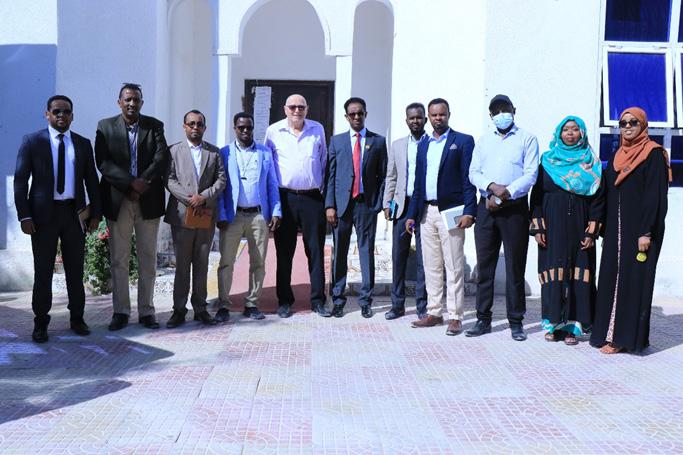
Civil Service Law Approved
After months of discussions, The Somaliland House of Representatives have voted in favor of the newly amended Civil Service Law. Immediately after the approval, the Somaliland President issued a Presidential Decree for immediate effectiveness of the law. The news came exciting to the public in general and for the civil servants in particular as this was the first time the law has been reviewed and amended since 1996 when it was first drafted. The new document addresses key issues and covers many gaps in the management of the Somaliland civil service. However, this has not come as easy as it seems. It took great efforts and process for the Civil Service Commission to come to this stage. For example, the CSC Chairman has been meeting with the Social Committee members of the Somaliland House of Representatives to discuss the amendments of the Civil Service Law and to speed up the approval process. Other similar meetings took have also been taking place since then where the CSC management have been meeting other stakeholders including the Solicitor General and Cabinet members for the same purpose. The new Civil Service Law will help the government successfully carryout developing Pay & Grading Policy as well as Human Resource Management Information System (HRMIS) and other policies and systems based on the new law.
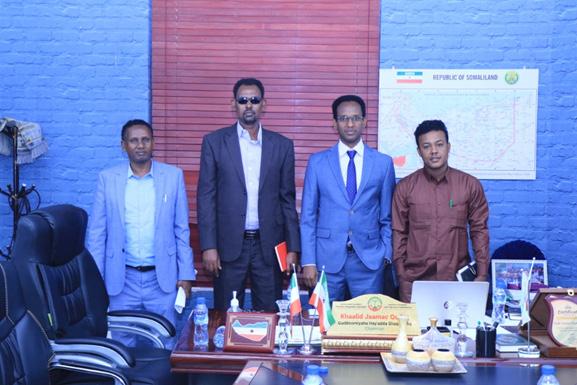
CSC Chairman Meets with Members of the House of Representatives in his office
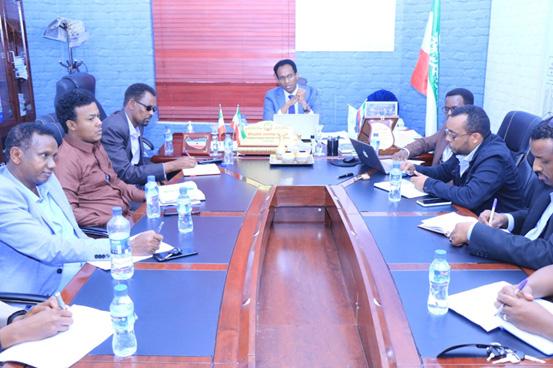
Public Service Pension Benefits in Somaliland

The concepts of welfare and pension were introduced in early Islamic law in the form of Zakat (charity), one of the five pillars of Islam, under the Rashidun Caliphate in the 7th century. This practice continued well into the Abbasid era of the Caliphate. The taxes (including Zakat and Jizya) collected in the treasury of an Islamic government were used to provide income for the needy, including the poor, elderly, orphans, widows, wayfarer and the disabled. Jizya is a per capita yearly taxation historically levied in the form of financial charge on permanent non-Muslim subjects (dhimmi) of a state governed by Islamic law.
There is currently no social security system in Somaliland. The system that existed during the colonial administration has not been in use for several decades. As a consequence, elderly public servants have three options of receiving income in retirement: (i) continue to work until they cannot work anymore – their salary effectively serves as their social security benefit; (ii) stop working and become financially dependent on other family members; and (iii) stop working and live in poverty. The reality of the situation, however, is that most civil servants continue to work beyond what should be regarded as retirement age because their salary supports a significant number of extended family members.
The overall problem that the Somaliland Civil Service Strengthening Project (CSSP) seeks to address is GoSL’s absence of a pension system to support the retirement needs of its employees. The Somaliland
National Development Plan I (SNDPI 2012-2016) concurs that the absence of government pension and social security systems and the supporting legislation and policies are among the policies and laws that need to be developed further to promote social development and protect citizen’s rights. The Somaliland National Development Plan I (SNDP) states that Somaliland people rely mainly on traditional, social protection structures (e.g. inheriting public sector jobs) rather than setting up a national social security fund and introducing a pension scheme for public and private workers.
The Government of Somaliland is planning to establish a pension system for eligible civil servants. This is the result of a government initiative to help people who otherwise might not save enough money to live on when they retire, and to make it possible for people to retire at normal retirement age. A Defined Benefit (DB) pension system has been agreed upon to provide employees with a predictable retirement benefit for life. DB plans are based on an established formula defined by a law. DB plans may be funded by employee and employer contributions and investment returns. The investment related risks are borne by the plan sponsor. The benefit formula is based on the years of service and the compensation.
In meetings held between the Government of Somaliland and the World Bank, the Government team presented cost projections and finally settled on the establishment of a pension and gratuity system starting in 2022. Necessary preparations should proceed immediately. The Government of Somaliland has made significant progress in terms of pension reforms. The proposed reform is embodied in a Pension Policy paper and draft law and includes the establishment of Public Pension Office at the Civil Service Commission, Review, finalize and approve the Pension Policy and the Bill, PMIS (Pension Management Information System), biometric registration of pensioners for proof of life, system roll-out to provinces, and capacity building. The Pension Fund will manage the pension scheme, including receipt of contributions, establishment of a bank account, recordkeeping and processing pension and gratuity applications, and payment of all benefits. In addition, the Pension Fund must establish a medical commission to verify and oversee the health condition of the pensioners.
Approximately, 1,200 civil service are currently pensionable across the country from all MDAs.
The Current Status
Somaliland Government established technical working group to complete the establishment of the Pension Fund. The main tasks of this working group duties include;
• Supporting CSC to oversee the progress and implementation of the pension fund’
• Drafting and reviewing the regulations, guidelines, regulations, and any other documents related to the pension fund management
A draft pension policy and law have been developed and now are under the process of review by the Solicitor General and there are continuous consultation meetings aimed at the finalization of the pension policy and bill. It is expected that the process to approve the Policy and Bill by the Cabinet and Parliament will be completed by end of July according to the plan.
Similarly, a Pension Management Information System (PMIS) will be developed to help the pension management once the documents are approved and become effective.
Civil Service Institute Trainings
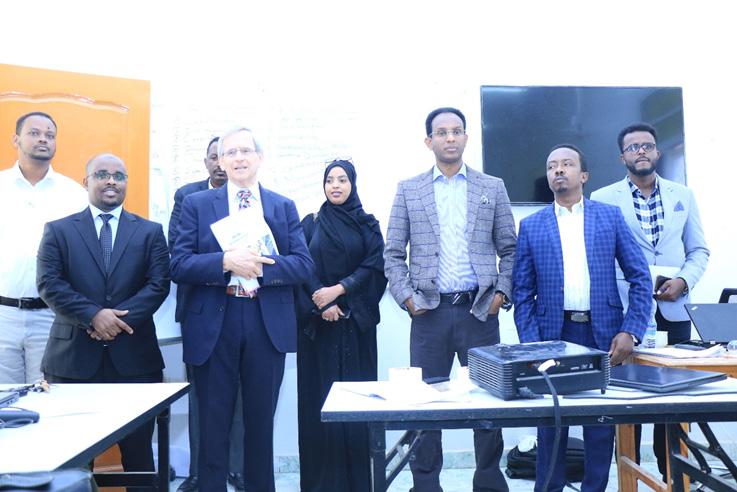
The Civil Service Institute (CSI) aims to strengthen the capacity of civil servants. It provides a solid platform for delivering training and development activities for the civil service. The CSI was established in 2005 and currently provides degree programs, a one-year diploma program and a joint master’s degree program as well as research and consultancy services. The institute also builds the capacity of its staff as well as Somaliland civil servants in delivering graduate programs. The institute creates a niche in state of art programs in human and institutional capacities that is aligned to the ongoing reforms and responds the training needs of individual institutions. CSI in collaboration with Ghana Institute of Management and Public Administration (GIMPA) developed and delivered for short-term and Long-term Training of Trainees (ToTs) programs in March 2022. The trainings targeted different Trainees including government Ministries, Departments and Agencies (MDAs), Non-for-Profit Academic Institutions, and the CSI community (CSI lecturers/ trainers, CSI Alumnus, & ECSU graduates). The Total participants of the trainings are 54 in which nine of them were females. Different methodologies were used during the trainings including group discussions, practical presentations and case studies. Those participants were selected by criteria that were prepared by CSI to screen the applicants due to their knowledge, teaching experience, and practical experience. The Overall Objectives of the training was to equip trainees with the requisite knowledge and skills required to perform the training function more effectively.
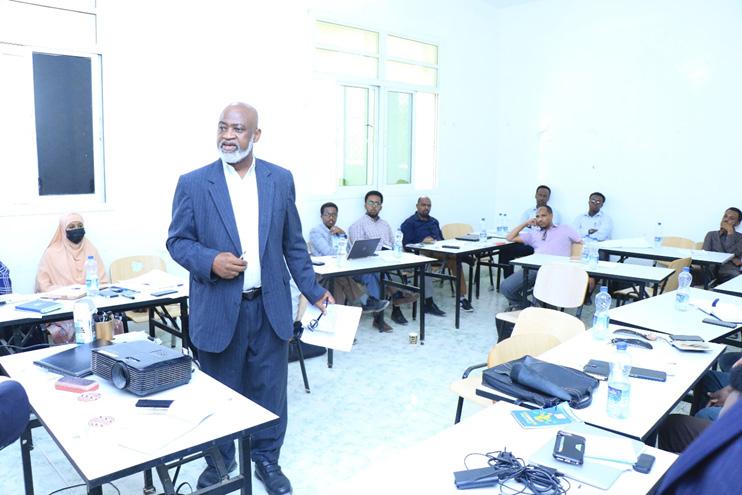
Civil Service Commission Staff Awarded for 2021 Performance
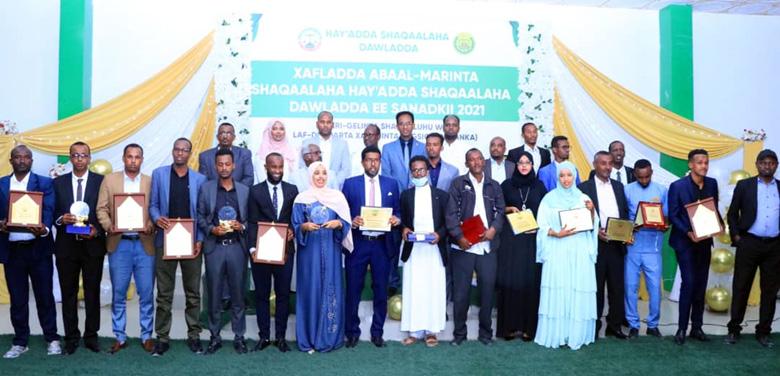
The Civil Service Commission’s Department of Performance Management and Appraisal has been Preparing staff Performance Targets and plans, staff Competencies, job evaluation, staff service Delivery, Staff Motivation and Rewards in preparation for the CSC staff awards for 2021. The level of service delivery and performance of the Civil Service Commission staff has been assessed in accordance with the Civil Service Law and according to the performance management and Appraisal Procedures. A Performance Management and Appraisal Committee have been established consisting of five members chaired by the CSC Director General and four Departmental Directors. The committee considered the following themes to finalize the staff appraisal: 1. Individual Performance Work Plan 2. Reviewing Staff Competence on Agreed Performance Work Plan during 2021. 3. Staff Attendance and Punctuality 4. Staff Behavior and attitude successfully An even was held at the Civil Service Hall where staff have been awarded for their performance in different categories during the year. The event was attended by members of the Cabinet, Heads of Public Institutions, Directors General, Departmental Directors and all staff of the Civil Service Commission. At the event were awarded Directors of Departments, Deputy Directors, Officers and Regional Coordinators of the Civil Service Commission.
CSC’s Employee of the Year
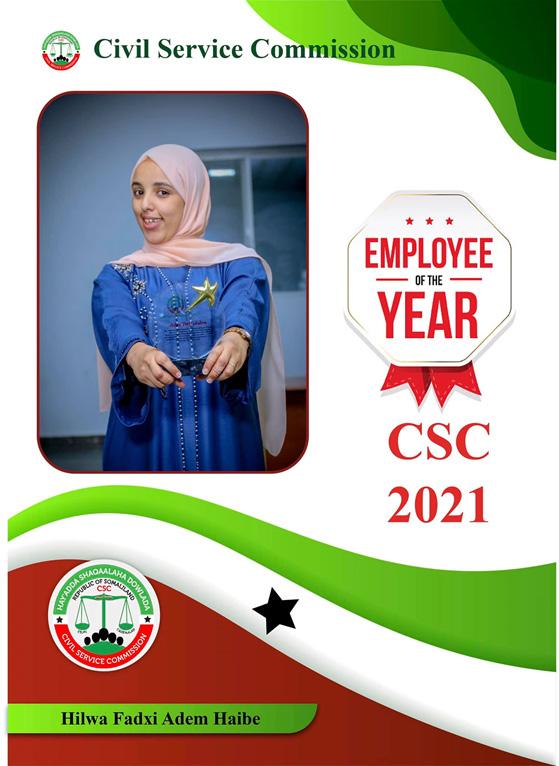
The Civil Service Commission’s Department of Performance Management and Appraisal has been Preparing staff Performance Targets and plans, staff Competencies, job evaluation, staff service Delivery, Staff Motivation and Rewards in preparation for the CSC staff awards for 2021. The level of service delivery and performance of the Civil Service Commission staff has been assessed in accordance with the Civil Service Law and according to the performance management and Appraisal Procedures. A Performance Management and Appraisal Committee have been established consisting of five members chaired by the CSC Director General and four Departmental Directors. The committee considered the following themes to finalize the staff appraisal: 1. Individual Performance Work Plan 2. Reviewing Staff Competence on Agreed Performance Work Plan during 2021. 3. Staff Attendance and Punctuality 4. Staff Behavior and attitude successfully An even was held at the Civil Service Hall where staff have been awarded for their performance in different categories during the year. The event was attended by members of the Cabinet, Heads of Public Institutions, Directors General, Departmental Directors and all staff of the Civil Service Commission. At the event were awarded Directors of Departments, Deputy Directors, Officers and Regional Coordinators of the Civil Service Commission.

CSC’s Employee of the Year
CSC’s Employee of the Yea
Waxaa jira heshiis wax ku ool ah oo ay ururadu ka faa’iidaysan karaan iyaga oo adeegsanaya qiimaynta shaqowanaagga. Si kastaba ha ahaatee, xog-uriranaha qaar waxa lagu ogaaday in maamulayaasha iyo shaqaaluhuba ay dareen-celin togan ka qabaan habka. Haddii aan la fahmin falcelinta shaqaalaha gaarka ah ee qiimaynta waxqabadka iyo macnaha guud ee goobaha shaqo, waxa hoos u dhacaysa ujeeddadii saxda ahayd ee loogu talogalay in loo adeegsado qiimaynta shaqo-wanaagga taas oo ahayd horumarinta shaqo-wanaagga shaqaalaha.
Sida caadada ah qiimaynta shaqo-wanaaggu waah al sanno waxaanu si guud u muujiya shaqadii sannadkaas. Waana hab socda inta lagu gudo jiro qiimaynta. Guulaha la gaadho xilliga qiimaynta laftigeeda waa in lagu muujiuo lana sugo foomka qiimaynta shaqaalaha.
Qiimayntu waa in ay noqotaa mid u dhigan qaab wada sheekaysi, iyada oo diiradda la saarayo guulaha la gaadhay iyo caqabadaha lala kulmay, iyo in la qiimeeyo haddii ay jirto baahi keenaysa in la beddelo yoolkii la lahaa si loogu sii diyaargaroobo waxyaabaha aan ku talagalka ahayn ee dhici kara. Wax-ka beddelka, wax-ku darka ama ka saarista qiimaynta yoolka waa in la sameeyo uun kaliya marka isbeddel weyni ku yimaaddo habsami socodka hawlaha taas oo keenaysa in dib loogu noqdo yoolkii shaqada.
Mararka qaar waxa dhacaya qiimayn sannadka dhexdiisa ah, taas oo ujeedadu tahay in agaasimaha iyo qofka shaqaalaha ah ee la abaal marinayaaba helo fursad ay iskula eegaan talaabooyinka uu qaaday qofka shaqaalaha ah ee ku saabsanaa qabashada hawlihii la isla gartay qabashadooda bilawgii qiimaynda, tani waa muhiim waana waajib.
Qiimayntu waxa ay ku eegtahay dhammaadka waqtiga soo gudbinta ama sannadka, agaasimahana waxa looga baahan yahay qiimayntiisa in uu gabagabeeyo dhammaadka sannadka. Ka hor qiimaynta, qofka la qiimaynayo waa in uu soo diyaariyo warbixin ku saabsan guulaha uu gaadhay. Agaasimaha ayaa dabadeed qiimayn doona waxyaabaha uu ka qabtay qorshayaashiisii, wuxuuna si gaar ah u eegi doonaa waxyaabihii aan ku talagalka ahayn ee dhacay muddadaas. Waaxda qiimaynta ee Hay’adda Shaqaalaha Dawladda waxa la aas’aasay bishii Juun, 2019. Aas’aaskeedu waxa uu ahaa mid ka mid Barnaamijka Dib u Habaynta iyo Tayaynta Shaqaalaha Dawladda. Barnaamijkan oo socday muddo dhan shan sanno. Barnaamijku waxa uu hiigsanayay in uu taageero siyaasadaha nidaamyada cudduda shaqaalaha wuxuuna bilaabmay sannadkii 2017. Qayb ka mid ah barnaamijka waxa ay ahayd in la shaqaalaysiiyo dadyow u fara dhuudhuuban shaqada. Waxaana la magacaabay agaasimaha waaxdan bishii Jeenawari 2020.
Hay’adda Shaqaaluhu waxa ay sidoo kale diyaarisay siyaasaddo iyo nidaamyo u gaar ah qiimaynta shaqo wanaagga. Waaxda shaqowanaagga ayaana badiyaa ka masuul ah qorshaynta, maaraynta, qiimaynta iyo horumarinta guud ahaan shaqo wanaagga Hay’adda. Waaxdu waxa ay leedahay nidaamyo lagu hubiyo in si sax ah loo raacay habraacyada maamul iyo qiimayn ee la diyaariyay. Hay’adda Shaqaaluhu waxa ay bilawday qiimaynta shaqada markii u horraysay 2020. Waxa wareeggaas qayb ka ahaa 18 Wasaaradood iyo Hay’ado dawladeed. Qorshuhu waxa uu ahaa in shaqaalaha Hay’adda Shaqaalaha iyo Wasaaradaha iyo Hay’adaha dawladda ee leh tilmaamahan:
• Keliya Wasaaradaha iyo Hay’adaha Dawladda ee leh habab casri ah oo agaasiman. Illaa hadda 18, Wasaaradood iyo Hay’ad dawladeed ayaa dhameeyay nidaamkan.
• Keliya Wasaaradaha iyo Hay’adaha dawladda ee hirgeliyay qorshe sannadeedkii shaqada
• Keliya shaqaalaha haysta heerka A iyo B
Waaxdu waxa ay hastaa xogta tababaradii Agaasimayaasha waaxaha shaqaalaysiinta ee 18-ka Wasaaradood iyo Hay’ad dawladeed. Dhammaantoodna waxa la siiyay qalabkii ku habboonaa si loo hirgeliyo shaqo wanaagga loona qorsheeyo qiimayn shaqo wanaag. Abdi Aden Diriye Guddoomiyaha Barnaamijka Civil Service Strengthening Project (CSSP)

Farriin ka socota Guddoomiyaha
Marka aan dib u milicsado dhacdooyinkii sannadkan dhammaaday, waxyaabaha aad ii farxad geliyay waxa ka mid ahaa sida wanaagsan ee shaqaalaheenu iskaga kaashadeen hirgelinta qorshayaashii la dejiyay ugana gudbeen caqabadihii ka hor yimid.
Waxa aynu wax badan ka baranay nafaheena iyo awoodaha Hay’adda Shaqaalaha Dawladda, waxa aanan rumaysanahay in aynu si guul ah u muujinay, marka la eego qiimayntii sannadkaa, in Hay’addu leedahay awood, karti iyo cudud shaqaale gaadhsiin kara adeegyadeeda shicibka reer Somaliland.
Waxa aynu isla meel dhignay qorshe sannadeed taabanaya dhinac kasta si loo gaadho yoolasha Hay’adda Shaqaalaha iyada oo marwalba la hubinayo tayada adeegyada. Waxa aan rabaa in aan u mahadnaqo dhammaan shaqaalaha ugana mahadceliyo dedaalkooda, heeganka iyo hawsha hufan ee suurogeliyay shaqadeena.
Illaa 2016, waxa aynu cagta saarnay weji aad u mihiim oo horseedaya isbeddel ku yimaadda adeegyada dawladda waxa aynu dib u habayn ku samayna shaqada iyo maamulka adeegga dawladeed taas oo horseedday hoggaamin iyo heer. Hadda waxa aynu ku jirnaa weji cusub oo is beddelkaas ah kaas oo ah dhammaystirka barnaamijyada socda sida HRMIS, bixinta iyo dalacsiinta, siyaasadda hawl-gabka, biilka iyo kuwa kale.
Marka laga yimaad dhammaan caqabadihii aynu la kulanay 2021, waxa aynu sii wadi doonnaa dedaalada iyo jihada aynu u jeedno sannadka cusub inanga oo ku darayna qiimayn iyo khibradihii aynu ka korodhsanay hawl maalmeedkeena iyo shaqadeena aynu la wadno Wasaaradaha iyo Hay’adaha Dawladda iyo daneeyayaasha kale.
Waxa iga go’an in aan la shaqeeyo qof walba iyo in aan sii wado gaadhida guulaha aynu rabno in aynu gaadhno eek u salaysan qorshaha xukuumadda. Guulaha aynu gaadhnay sannadkii hore waxa ay inagu sii dhiirigelinayaan dedaalada sannadkan 2022.
Qof kasta oo ka mid ah Hay’adda
Shaqaalaha
Dawladda, waxa aan ku bogaadinayaa dedaalkiisa iyo hawsha uu qaranka u hayo, waxaanan idiin wada rajaynayaa guul.
Khalid Jama Qodax Gudoomiyaha Hay’adda Shaqaalaha Dawladda









